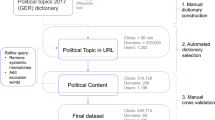Abstract
As is the case in many democratic countries, MPs in Switzerland are close to their constituencies and have adapted to the various new means of mass communication as these emerged over the last century: from newspapers to the Internet, via radio and television. Today, a large majority of Swiss MPs have both an e-mail address and a homepage. This paper explores the use of the Internet by the Swiss MPs for their relationship with citizens almost two years prior to the next national elections for the Federal Parliament (2007). It is based on a quantitative and qualitative survey of all the personal homepages of the members of the lower and upper houses conducted in 2005. Particular attention is paid to interactive means of communication (such as e-mail, forums, blogs, online polls, chats, etc.) that are made available in order to foster online dialogue between politicians and citizens. Based on this data, on a few European comparisons, and on some focused observations of particular sites, the paper identifies the new challenges and opportunities that Swiss MPs must face to better interact with their electorate.
Preview
Unable to display preview. Download preview PDF.
Similar content being viewed by others
References
Caldow, J.: The Virtual Ballot Box: A Survey of Digital Democracy in Europe. IBM Institute for Electronic Government (1999), http://www.ieg.ibm.com (May 13, 2005)
Chappelet, J.-L.: The appropriation of e-mail and the Internet by members of the Swiss Parliament. Information Polity 9(1-2), 89–102 (2004)
Chen, P.: Australian Elected Representatives use of New Media Technologies. Research Report, Center for Public Policy, University of Melbourne, June 17 (2002)
Coleman, S.: Connecting parliament to the public via the Internet: Two case studies of online consultations. Information, Communication &Society, 1–17 (March 2004)
Coleman, S., Nathanson, B.: Learning to live with the Internet: How are European parliamentarians adapting to the digital age? EPRI Knowledge, Brussels (2005)
Galland, B., Chappelet, J.-L.: Cyberparlementaires: l’appropriation de l’Internet par les parlementaires fédéraux. cahier de l’IDHEAP, Lausanne (2001)
de Graffenried, V.: Le blog, nouvelle arme électorale des partis. Le Temps, Geneva (2006)
Hoff, J.: The democratic potentials of Information Technology: Attitudes of European MPs towards new technology. Information Polity 9(1-2), 55–66 (2004)
Jeanneret, M.: Les politiciens, ces cyberlosers! Le Matin, Lausanne, p. 21 (2005)
Kernaghan, K., et al.: Politicians’ use of ICTs: A Survey of Federal Parliamentarians (November 2003), http://www.publicsectorit.ca/publications/CBStudy.pdf
Neymanns, H.: eCandidates 2002 – der King lebt. PolitikDigital, Berlin (2002), http://www.politik-digital.de
Norris, P.: Virtuous Circle: Political Communication in Post-Industrial Democracies. CUP, Cambridge (2000)
Schaffner, D.: Trotz positiver Erfahrung sollen auf der Website des eidgenössischen Parlaments in Zukunft nur selten Diskussionen stattfinden. Tagesanzeiger (September 3, 2002)
Ward, S., Gibson, G., Lusoli, W.: Old Politics, New Media: Parliament, the Public and the Internet (2005), http://www.ipop.org.uk (May 13, 2005)
Wuthrich, B.: Internet débarque dans l’arsenal électoral des parlementaires. Le Temps, Geneva (1999)
Zittel, T.: MPs and the Internet: Between the Rock of Technology and the Hard Place of Politics. In: Proceedings of the EPRI Conference, Stockholm, October 27-28 (2004)
Zimmer, C.: Bitte kommen Sie später wieder. Facts, Zürich, pp. 24–26 (2005)
Author information
Authors and Affiliations
Editor information
Editors and Affiliations
Rights and permissions
Copyright information
© 2006 Springer-Verlag Berlin Heidelberg
About this paper
Cite this paper
Chappelet, JL., Kilchenmann, K.P. (2006). From Market Squares to Homepages: A Survey of Swiss MPs’ Interactivity. In: Wimmer, M.A., Scholl, H.J., Grönlund, Å., Andersen, K.V. (eds) Electronic Government. EGOV 2006. Lecture Notes in Computer Science, vol 4084. Springer, Berlin, Heidelberg. https://doi.org/10.1007/11823100_8
Download citation
DOI: https://doi.org/10.1007/11823100_8
Publisher Name: Springer, Berlin, Heidelberg
Print ISBN: 978-3-540-37686-6
Online ISBN: 978-3-540-37687-3
eBook Packages: Computer ScienceComputer Science (R0)




